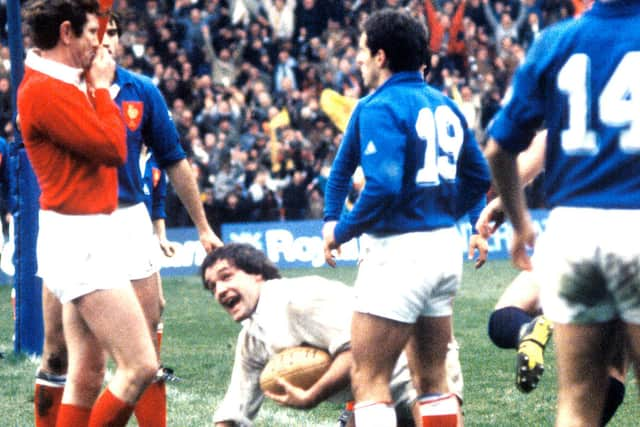Scotland will need to show same heart as class of ’84 to get the better of France


Meanwhile, we can at least be thankful for the improvised Nations Cup and look forward to tomorrow’s match against France. By chance, when clearing out a drawer this morning I happened on the programme for the Grand Slam decider against France in 1984, a very informative programme too. It listed the varied employments of all the Scottish players - Joiner, Schoolmaster, Car Sales Proprietor, Solicitor, Grain Merchant, Building Society Executive, Electrician, Company Manager, Laboratory Technician (that was the mighty Bear), Bricklayer, Gas Board Executive, Export Executive, Architect, Electronics Technician, while skipper Jim Aitken was, appropriately, Managing Director. All were doubtless back at work on Monday, still with sair heids.
As for the French team, not only did many of the names bring happy memories, nostalgia was also provoked by some of the clubs represented, clubs like Dax, Narbonne, Tarbes, Nice and Boucau which have slipped out of the top rank.
Advertisement
Hide AdAdvertisement
Hide AdThen there was the pre-match music, provided as usual by the Pipes and Drums of Queen Victoria School, Dunblane, and also by the Band of the 1st Battalion of The Argyll and Sutherland Highlanders who gave the crowd not only military marches, but a rendering of “Raindrops Keep Falling On My Head”, as they so often did in the great bowl of the terracing open to the elements.
Well, it was a great day, March 17, 1984, coach Jim Telfer’s birthday too. Early in the evening I encountered Scotland’s first-ever coach, Bill Dickinson on the Waverley Steps. Usually loquacious, all he could say was “Heart, it was just heart.”
Well, Gregor Townsend’s one will also need heart tomorrow, for they are up against a French team which, like the one led by Jean-Pierre Rives 36 years ago, has been playing some great rugby, a potent blend of power and virtuosity. They scored tries against Ireland on the last Six Nations day of the kind we dream of, but – as Gregor and his coaches will have noted – there were moments when their concentration lapsed.
The same charge might have been levelled against Scotland in the first half in Florence when Italy certainly outplayed them. They showed skill and resolution to take charge of the game after the interval, so that they were able in the end to win it quite comfortably.
But a repeat tomorrow of that first-half performance might leave them so far behind that there would be no coming back. In retrospect one may choose to call the first half against Italy a useful reality check. It wasn’t all bad of course, for the defence held up pretty well.
Scotland had the best defensive record in the Six Nations, conceding fewer tries than any other team. Even if you remark that two of the games – the Calcutta Cup and the match against Wales in Llanelli – were played in conditions which made low-scoring likely, this is evidence of a remarkable improvement. If it’s maintained tomorrow we have a good chance of extending the run of victories to six, a number not reached since the 1920s.
A try is a try of course whether it comes from a length of the field handling movement or is scored, like Jim Calder’s winning one in 1984, from a distance of a couple of yards. It takes skill and good timing as well as power to score a try from a rolling maul, and forwards have a right to feel indignant if one expresses a wish for something more spectacular.
In extenuation one can only say that any such wish, or, as may be thought, expression of dissatisfaction, is a sort ofcompliment, at any rate evidence of the team’s improvement.
Advertisement
Hide AdAdvertisement
Hide AdWhen you are struggling to win at all, any sort of try is welcome. Once you are making a habit of winning, fans and hacks alike may become more demanding, even greedy, and say that we want to win with style and a bit of swagger. Selfish, of course, it’s also a compliment of sorts. The better the team, the more demanding we become.
The absence of a crowd makes a difference, though one has the impression that the players have responded to the silence and lack of atmosphere remarkably well. There have of course been dark days in the past at Murrayfield when the ground wasn’t full and even 40,000 or so spectators found it hard to raise a cheer.
Meanwhile, let’s enjoy what is possible now, and hope that, by February when the Six Nations kicks off, some sort of crowd, even a limited, socially-distancing one, will be permitted. The players may not need a crowd, but they deserve one.
Comments
Want to join the conversation? Please or to comment on this article.